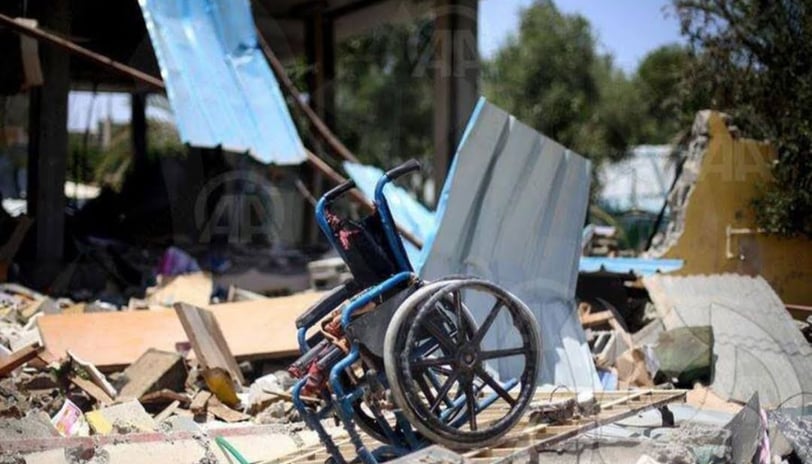The Unspoken Tragedy: How War and Blockade Turned Life for Gaza’s Disabled into Daily Hell
Under relentless strikes and a harsh blockade, Gaza’s disabled have endured catastrophic loss: 400,000+ with disabilities, 26,000 needing long-term rehabilitation, and thousands of child amputees. Explore the humanitarian collapse, shattered healthcare, and deep psychological and social impacts.
REPORT
Refaat Ibrahim
7/2/20253 min read


The Forgotten Disaster: Disabled Lives in Gaza Torn Apart by War and Blockade
Under the unrelenting bombardment and suffocating siege, people with disabilities in Gaza are pushed further to the margins. Their daily lives have deteriorated into a grim struggle for survival.
Amid widespread destruction and the collapse of a fragile health system, their suffering has reached unprecedented levels, making them among the most vulnerable victims of this ongoing humanitarian catastrophe.
Staggering Statistics: The Scale of the Disaster
Before the October 2023 escalation, approximately 98,000 Palestinian children (ages 2–17) had disabilities in Gaza, according to estimates from UNICEF and the UN. Since then:
104,000+ people have been injured because of the war, and a quarter (≈ 26,000) require long-term rehabilitation for life-changing injuries.
Among them, over 2,000 sustained spinal cord or traumatic brain injuries; 15,000+ are now living with permanent disabilities.
Child amputees have surged. UNICEF notes over 1,000 children lost limbs within the first ten weeks, while Save the Children reports 10 children lose a limb daily, with over 10,000 child amputees since October 2023, accounting for nearly 15% of Gaza’s child population.
Today, more than 400,000 people in Gaza live with disabilities, a staggering number in a region where services and infrastructure have collapsed.
Overwhelming Humanitarian Challenges
The challenges these individuals and their families face are extreme and multilayered:
No Safe Escape for Disability: Disabled individuals often cannot participate in evacuation efforts. There are virtually no early warning systems or accessible shelters, a stark reality documented by Human Rights Watch and others.
Basic Needs Denied: Water, food, and medications are scarce. People with disabilities require increased water usage for hygiene and medical supplies, all of which are in short supply. Accessible facilities like raised toilets are virtually nonexistent.
Assistive Devices Impossible to Get: Prosthetics, wheelchairs, crutches, catheters, and medical pads are either unavailable or prohibitively expensive. Limited nursing and at-home care compound the physical and mental burden placed on caregivers.
Economic Collapse: With livelihoods destroyed and the economy in ruins, families cannot afford special diets, fuel for transport, medication, or assistive devices, pushing them further into poverty and despair.
Healthcare System Destroyed: A Final Blow
Gaza’s healthcare system was already precarious; now it's in shambles.
Medicine & Supplies Completely Lacking: Essential medications for chronic conditions, pain relief, infection, and wound care are nearly obsolete. Psychological drugs are almost nonexistent.
Rehabilitation Centers in Ruins: Facilities critical for prosthetics and physical rehabilitation, such as the Sheikh Hamad Center, were severely damaged in early 2024. The few operational centers lack neurologists, therapists, and specialized equipment.
Access Is Virtually Impossible: Even when services are available, destroyed infrastructure, fuel shortages, and inaccessible roads prevent transportation for those needing care, particularly internally displaced or remote-area residents.
Psychological & Social Devastation: Invisible Wounds
The emotional impact rivals the physical trauma.
Trauma & Loss of Hope: Sudden disability leads to shock, chronic PTSD, anxiety, and deep depression in adults and children alike. UNICEF documents severe mental health effects among injured youth.
Disrupted Lives & Dreams: Routines based on therapy and school are dismantled. Plans for education or work vanish, stealing even the idea of a future.
Family Burden Multiplied: Caring for disabled members under siege adds emotional stress, financial strain, physical exhaustion, and social sacrifice. Many families abandon the needs of other children just to keep their disabled loved ones alive.
Stigma & Isolation: Disabled people are increasingly seen as “burdens" in a society stripped to survival. They face marginalization and neglect and are often hidden away, reinforcing invisibility and shame.
A Plea to the World: Urgent Action Needed
The plight of Gaza’s disabled is not just a humanitarian shortfall; it’s a symptom of systemic failure to protect the most vulnerable:
Safe Humanitarian Access: Immediate corridors for medical supplies, assistive devices, food, water, and fuel must be guaranteed, with full inclusion of disability needs.
Rebuilt Health & Rehabilitation Infrastructure: Mobile clinics, field workshops, and capable professionals must be funded and equipped to rebuild essential services.
Psychological Support at Scale: Trauma specialists, crisis counselors, and community mental health programs should support both individuals with disabilities and their caregivers.
Inclusive Aid Programs: All relief efforts supported by donor governments must account for accessibility: housing, nutrition, clean water, education, and livelihood support.
Long-Term Legal Responsibility: International bodies must hold decision-makers accountable, enforce laws of armed conflict, and recognize rights of the disabled in conflict zones.
Conclusion
The war and blockade have turned the lives of over 400,000 disabled Gazans into daily suffering. With crumbled health systems, denied human dignity, shattered futures, and psychological destruction, this is a silent disaster.
Gaza’s disabled cannot wait for fleeting ceasefires or empty commitments. They need a timely, inclusive, and sustained global response, or this forgotten community’s suffering will carve permanent scars into Gaza’s collective soul.
Awareness
Documenting reality, amplifying Palestinian voices, raising awareness.
Contact Us:
resistant.p.pens@gmail.com
Follow our social media
